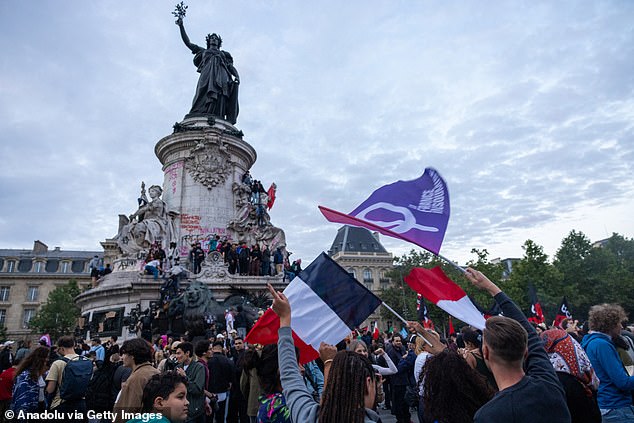French markets were hit by a volatile session yesterday following the defeat of Marine Le Pen’s far-right National Rally (RN) party.
The CAC 40, the main benchmark index on the Paris Stock Exchange, fell sharply in early trading before recovering.
But gains faded as the session progressed as the reality of a hung parliament and another few months of uncertainty took its toll. It closed down 0.6 percent.
The leftist New Popular Front (NPF) emerged as the largest party, with President Emmanuel Macron’s Ensemble in second place.
The RN, which had led in the first round, was relegated to third place, but no party won a majority.
Celebrations: France’s left-wing New Popular Front emerged as the largest party, with President Emmanuel Macron’s Ensemble second
French 10-year bond yields – a measure of the cost of government borrowing – rose sharply in early trading before falling to their lowest level since June 26.
And the euro fell against the pound and the dollar before recovering some of its losses.
Jim Reid, a strategist at Deutsche Bank, said: ‘The NPF has the most fiscally aggressive programme in terms of spending and taxes and the market will be suspicious that the prospect of them being in government now or later will bring with it higher deficits.
“However, trying to form a government that has any kind of stability seems a very difficult goal. Political paralysis over the next 12 months seems the most likely outcome,” he said.
Analysts fear that Macron’s unpopular reforms designed to tackle France’s staggering debt (which stands at more than 110 percent of GDP) could be jeopardized by the chaos.
But the lack of a majority for both the left and the far right reduces the risk that they will implement policies that could result in a further deterioration of public finances.
“These election results are unlikely to have a lasting negative impact, given that there will essentially be no significant change in the political situation in the National Assembly,” said Nomura, an expert at Japanese bank.
Far-left leader Jean-Luc Melenchon’s refusal to work with Macron could mean a minority government of centrist and centre-left parties, analysts at the bank said.
Holger Schmieding, chief economist at Berenberg, said: “The fact that the left has become the strongest group in parliament raises serious concerns. France is heading into a period of political uncertainty and, most likely, fiscal problems.”
The Bank of England has warned that uncertainty surrounding the French and other global elections could create risks to UK financial stability.


